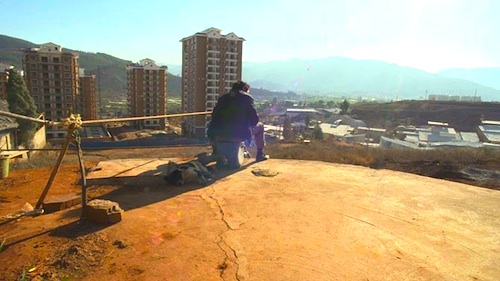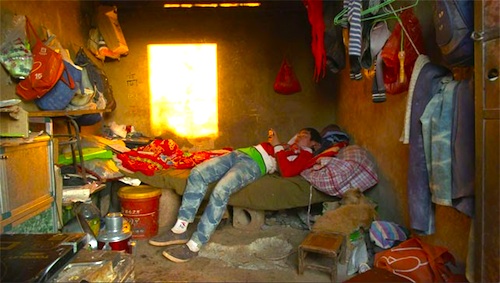
By Joe Bendel. It is yet another example of the appalling lack of free speech and press protections in contemporary Mainland China. Documentarian Wang Bing had intended to follow the lives of subsistence laborer Cai Shunhua and his two tweener sons Yongjin and Yonggao in his typically in-depth, observational fashion, but threats from the father’s landlord-factory owner forced the filmmaker to halt the project after a few days of shooting. It is therefore hard to really judge the resulting film, but at least Wang gives the world a good hard look at the mean living conditions the exploitative boss presumably wanted to keep under wraps in Father and Sons, which screens during MoMA’s 2015 Documentary Fortnight.
We have no idea where their mother is or whether there might be anymore extended family back in the countryside. Since 2010, Yongjin and Yonggao have lived with their migrant worker father in a four meter square single room occupancy. There is a stove and you had better believe they have a TV, but that is about all the amenities life affords them. Watching them carefully allot squares of toilet paper before leaving for whatever outside facilities are available to them should give you an idea of the scarcity of their resources.
Wang Bing has certainly never been intimidated by long takes in his previous documentaries, but they usually framed considerable real life drama. Fengming: a Chinese Memoir simply focuses on an elderly survivor of the Cultural Revolution telling her story on-camera, but her oral history is absolutely riveting and heavy with historical significance. Three Sisters is an absolutely heartbreaking record of the difficulties faced by the titular rural siblings, particularly the eldest. ‘Til Madness Do Us Part might not have been as emotionally engaging, but its unvarnished look inside a provincial Chinese mental asylum is often quite shocking.

In contrast, the majority of the shots in F&S capture Yongjin and Yonggao watching television—ironically, they are usually watching something more interesting than we are. Wang seems to be trying to convey a sense of the indolence that comes out of a sense of hopelessness, but a little of this goes a long way, especially in a ninety minute film. Still, it is not fair to criticize Wang for the static repetitiveness of the film.
Frankly, it is admirable he was able to keep faith with the Cai family and cobble together a film representative of their hardscrabble lives from the limited footage he was able to shoot. We can look at Three Sisters and imagine what could have been had Wang been allowed to observe his subjects as their lives developed over time. Father and Sons is probably best seen and programmed in conjunction with other Wang films, so it can serve as another small piece in his overall documentary mosaic of contemporary Chinese life. On its own, it is not an especially rewarding viewing experience, but it is still cool that MoMA selected it for this year’s Documentary Fortnight, because of the wider circumstances surrounding it. For those who understand what to expect, Father and Sons screens this Tuesday (2/17) and Wednesday (2/18) as part of this year’s Documentary Fortnight.
Posted on February 16th, 2015 at 11:01am.